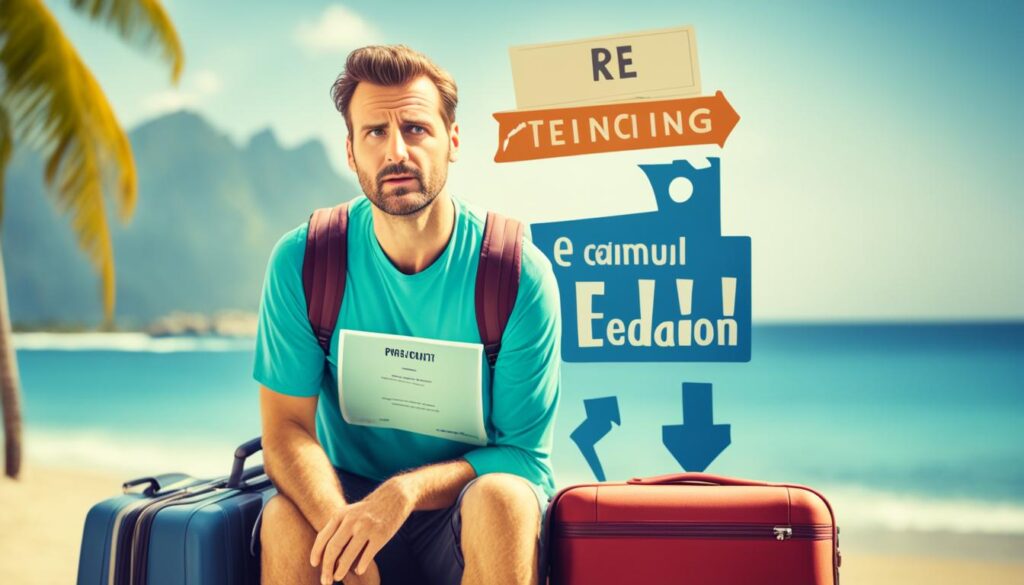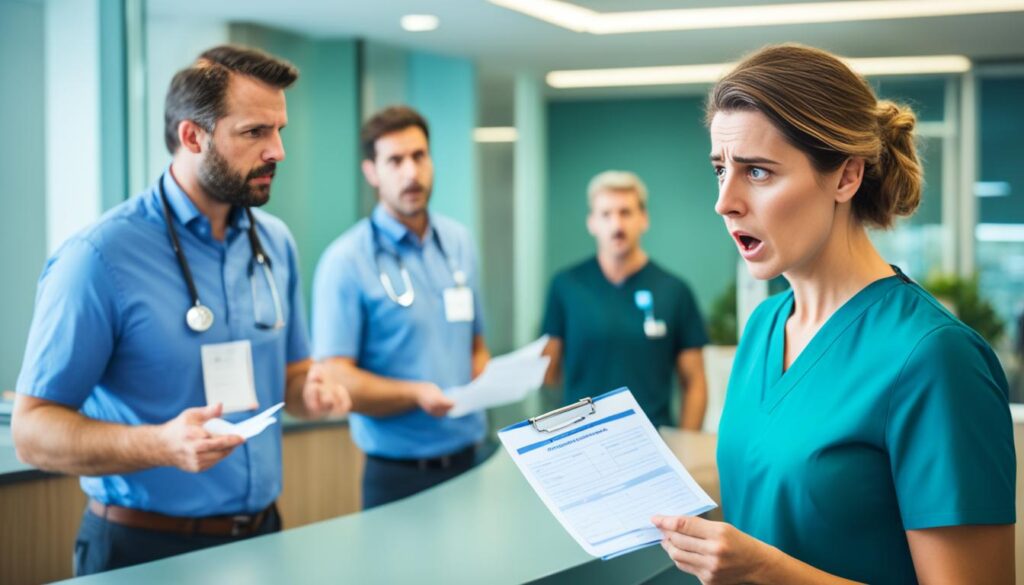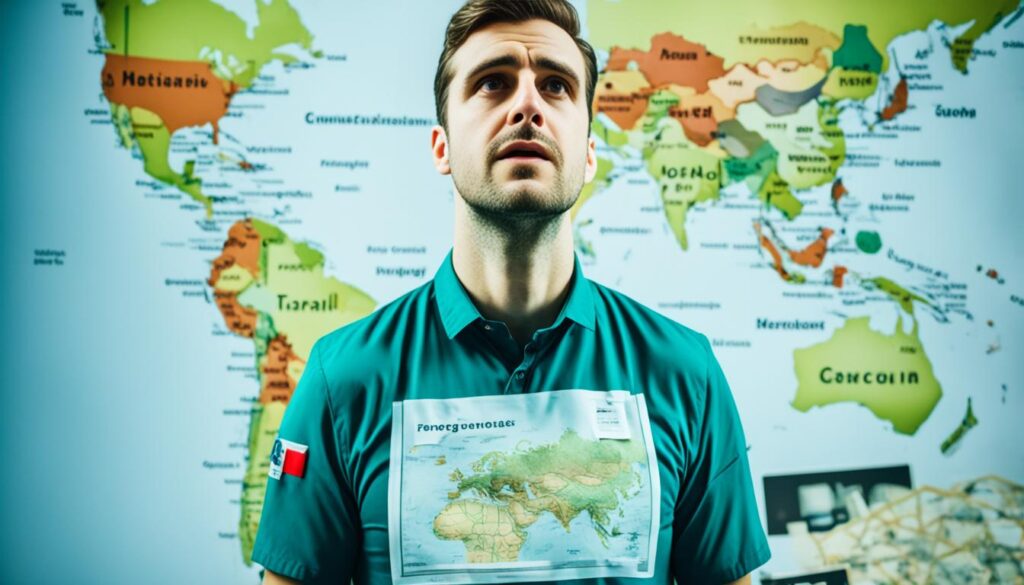Medical emergencies can happen anytime, especially when you’re exploring new places alone. But, being ready and having the right mindset helps make things better. Here’s a guide with tips to manage medical emergencies while traveling solo.
Imagine walking in a European city or a lonely wilderness when a health issue strikes. This guide helps you understand what to do. It covers staying calm, breaking language barriers, and getting the medical help you need.
Key Takeaways
- Develop a plan for handling medical emergencies while traveling solo
- Learn how to assess the severity of a situation and provide first aid if necessary
- Research local medical facilities and understand your travel insurance coverage
- Prepare a comprehensive medical kit and familiarize yourself with essential medications
- Strategies for overcoming language barriers and cultural differences when seeking medical care
Emergencies: Staying Calm and Prepared
When you’re alone and a medical emergency hits, keeping calm is key. It might seem overwhelming at first. But, if you’re collected, you can figure out what to do next.
Assessing the Situation
Start by taking a deep breath and looking at the problem. Can you fix it with what’s in your first aid kit? Or, does it need a doctor’s help? Notice if there’s any heavy bleeding or if someone has trouble breathing. Always trust how you feel. If you think it’s too much for you, get help right away.
First Aid Essentials
Being ready for anything is a must when you’re on your own. Have a first aid kit with you. Here’s what you should include:
- Bandages of various sizes
- Antiseptic wipes
- Gauze pads
- Adhesive tape
- Scissors
- Tweezers
- Medications for pain, fever, and allergic reactions
With these first aid essentials at your fingertips, you can handle Emergencies better. Plus, you can keep your cool when medical surprises come up while traveling alone.
“The greatest weapon against stress is our ability to choose one thought over another.” – William James
Researching Local Medical Facilities
Getting ready for a trip, especially alone, means checking out local medical help. Know where to go for medical needs. This can really help in an emergency.
Here are key tips for looking into Local Medical Facilities:
- Find out about well-known hospitals and clinics in the area. Choose places known for their good care and services.
- Understand what the local facilities can do. They should offer the kind of care you might need, like emergency services and special treatments. It’s also good if they can talk to you in your language.
- Make sure you can talk easily with the medical staff. It’s important to find out if they speak your language or if there are translators.
- Ask about emergency plans and how quickly they can respond. This knowledge helps you be ready in case something goes wrong.
- Look into nearby pharmacies. Check what kind of medicine they have. This info can be very useful if you need a prescription or some over-the-counter drugs.
Researching Local Medical Facilities before your trip makes you feel more ready. It helps you handle health issues with more confidence. Knowing where to get help gives peace of mind.
It’s true:
“Proper preparation prevents poor performance.”
Remember, learning about Local Medical Facilities is key for your safety. Take the time to gather this info. It will help you if you face any health emergencies while traveling.
Packing a Comprehensive Medical Kit
It’s key to have a medical kit when you’re on your own. This comprehensive kit can help with big or small medical emergencies during your trips. Let’s look at what you need in your medical kit.
Essential Medications
Put together a mix of essential medications for common health issues. Bring painkillers, antihistamines, and meds for upset stomachs. If you need any prescribed drugs, toss those in too. And having an antibiotic for infections is smart. Make sure your medications aren’t expired and keep them in a cool, dry place.
First Aid Supplies
Besides essential medications, add lots of first aid supplies to your medical kit. You’ll want bandages, gauze, and wipes for cleaning. Also, scissors, tweezers, and gloves for handling cuts and scrapes. Don’t forget a thermometer, ice and heat packs, and any special tools you need, like a severe allergy injector.
Having a medical kit with all you need helps for solo trips. Make sure it has essential medications and first aid supplies. Always check your kit so it’s ready whenever you go.
Understanding Travel Insurance Coverage
Travel insurance seems complicated, but it’s important. Especially when you might face a medical emergency. It’s key to look closely at what each policy offers. Check the coverage on pre-existing conditions carefully.
Pre-existing Conditions
Most insurance plans don’t fully cover pre-existing health issues. It’s crucial to be clear on these limitations. Pre-existing conditions are health issues treated or diagnosed within a certain period before your trip.
Getting coverage for pre-existing conditions might mean upgrading your plan. This could cost extra. Yet, the peace of mind it brings is invaluable in emergencies.

Always read the details of your travel insurance policy. Look for any rules or exceptions related to pre-existing conditions. Knowing these can guide you in picking the best policy for you.
“Purchasing travel insurance with a pre-existing condition waiver can provide valuable protection and give you the confidence to explore the world without worry.”
By carefully understanding your travel insurance, you’ll feel more secure during your trips. With a good policy, you can enjoy your travel and worry less about emergencies.
Emergencies: Staying Connected
When you’re far from home, a medical crisis can be even scarier. Knowing the right people and staying connected is key. prepare for the unexpected before it’s too late.
Emergency Contacts
Start by making a list of emergency contacts. Add local police, fire services, and ambulances where you are. It’s important to include your travel insurance provider. They will help you handle medical needs locally.
Add friends or family’s contacts too. They can help by being your go-between and offering support. Tell them where you are and what you’d need in an emergency.
Save all these numbers in your phone. Also, keep a printed list in your wallet or travel bag. This way, you’re ready if anything goes wrong.
Build this network now. So, if trouble comes, you’ll have support and peace of mind. Being connected can make all the difference when you’re far from home.
Handling Language Barriers
Dealing with medical issues alone in another country can be tough, especially when there’s a language barrier. Thanks to my travels, I know how to beat this challenge. I use smart ways to talk clearly with doctors and nurses.
Translation Apps and Services
Having translation apps on my phone is a game changer. I use apps like Google Translate, iTranslate, and SayHi Translate. They help me quickly share what’s wrong in the local language. This is super helpful in emergencies when I need to talk fast.
I also carry a small phrasebook with medical words. Knowing a few key terms in the local language can really help. It makes talking with medical staff easier. They see I’m trying and it often helps build trust.
If things get really tricky, I look for a professional interpreter. Many healthcare places have people who can help translate. They make sure important details are clear. This makes a big difference in receiving the right care.
“Clear communication is the foundation of effective medical care, and I’ve learned to never underestimate the power of translation tools and services when traveling alone.”
By using various tools like apps, books, and interpreters, I’ve managed to cross language barriers. This approach has made a significant difference in my travels. It shows how important it is to prepare well for any situation.

Dealing with Cultural Differences
Handling medical emergencies on your own can be tough. Cultural differences make it even more complex. It’s vital to know and respect the local customs when getting medical help in a new place. This way, you make sure to get the right care even in a crisis.
Family and community roles matter in choosing healthcare in some places. Here, decisions are often made with the family’s advice. Showing respect for this can help you talk openly with doctors.
Understanding traditional and alternative medicines is also crucial in many areas. They are part of how people care for their health. Being ready to understand and accept these methods can help you greatly.
- Get to know the local healthcare customs before you travel.
- Respect the family’s influence on medical choices.
- Be open to traditional or alternative medicine.
- Talk clearly with doctors, and ask questions to be sure you grasp your treatment.
Showing deep respect for different cultures during emergencies is important. It helps you get the care you need with fewer conflicts. Being open to new ways of thinking in urgent situations can truly save the day.
“Understanding and respecting cultural differences is the key to navigating medical emergencies with grace and sensitivity.”
Maintaining Personal Safety
Traveling alone is very rewarding, but safety is key, especially in medical emergencies. Stay aware and take steps to protect yourself. This ensures your safety is always a priority.
Situational Awareness
Knowing what’s going on around you is vital for safety. Watch your space, look for danger, and be careful with how you talk to people. Don’t be alone too much and avoid calling extra attention to yourself. Always trust your gut if something doesn’t seem right.
Here are tips to boost your awareness:
- Pay close attention and listen for anything unusual in your environment.
- Don’t wear flashy or expensive items to keep from standing out to thieves.
- Make sure important items like your passport and money are hidden and secure.
- Learn about local customs and laws to fit in better and avoid trouble.
It’s vital to stay safe in a medical crisis, especially abroad. Be alert and take steps to avoid extra problems and bad situations.
“Being alert in your environment is everything for staying safe. When you know what’s around you, you’re ready for danger or emergencies.”
Always put your safety first. Stay sharp and make good choices, even in medical emergencies. This way, you deal with any issues confidently and keep yourself safe, especially if you’re on your own.
Seeking Consular Assistance
When in a medical emergency on a trip alone, your country’s consulate or embassy can help a lot. They are there to support and keep their citizens safe when far from home. You can get lots of different kinds of help to deal with tough times.
If a big medical problem happens, your first move is to contact your country’s consular officials. They can aid in getting you emergency medical care. They also help speak to local authorities for you. Talking to the consulate opens the door to a pool of help and advice that can change things for the better when under stress.
Consular Services: What They Can Offer
Let’s look at what your country’s consular office can do for you:
- Arranging emergency medical assistance and helping to facilitate your treatment and hospitalization
- Contacting your family or next of kin to keep them informed and coordinate any necessary support or travel arrangements
- Assisting with language barriers by providing translation services or connecting you with local interpreters
- Advocating on your behalf with local medical providers and authorities to ensure you receive the best possible care
- Providing guidance on your travel insurance coverage and helping to navigate the claims process
- Facilitating the return of your personal belongings or the repatriation of your remains, if necessary
The consulate can be a huge help in a medical crisis away from home. Seeking Consular Assistance gives you a key supporter. This person can ensure your rights are protected and help get you the medical care and support you need.
“The consulate is your lifeline when you’re facing a medical crisis far from home. They have the resources and expertise to help you through it.”
The consulate is all about helping and supporting you. So, always know you can ask for help if a medical issue hits while you’re traveling by yourself. With their support, you can work on getting well and back on your path quickly.
Managing Stress and Anxiety
Facing a medical emergency alone while traveling is terrifying. It’s key to have coping strategies ready to stay focused during a crisis. By using simple ways to calm down and taking care of yourself, you can make tough situations easier to deal with.
Coping Techniques
Deep breathing is a great way to slow down stress. Inhale deeply, hold, then exhale slowly. This can lower your heart rate and relax you. Also, doing easy physical activities like walking can help you feel better.
Keeping a positive outlook matters a lot. Know you’re strong enough to handle what’s happening. Imagine a good result and think about what you can do. This approach lets you feel more powerful and confident in tough times.

